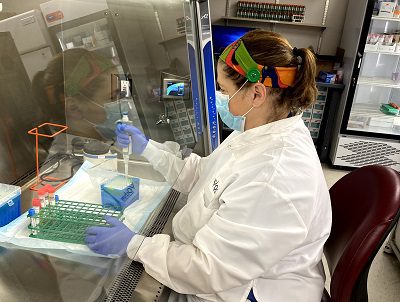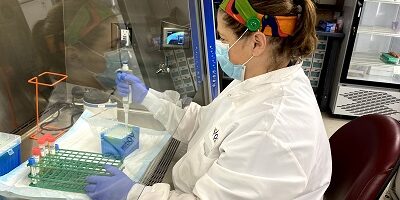Karrie Hovis, MHS, MLS(ASCP)CM, CQIA
 |
| Author Karrie Hovis was redeployed to the molecular laboratory to perform the SARS-CoV-2 assay. |
Monday, March 9, 2020, started like any other weekday. Kids went to school while parents reported to the office. However, the citizens of New Orleans and surrounding areas were not prepared for what the next five days would bring.
On that same day, Ochsner Medical Center-New Orleans admitted its first COVID-19 patient. March 11 would bring several COVID-19 declarations: the World Health Organization declared a global pandemic, Louisiana Governor John Bel Edwards declared a statewide public health emergency, and Mayor LaToya Cantrell did the same for the city of New Orleans. By Friday, March 13, President Trump declared a national emergency for the United States. In just five days, our lives had drastically changed.1 Schools were closed, and festivals were canceled. It felt as though we were at war, and the enemy was a large-sized virus, approximately 120 nm in diameter, otherwise known as SARS-CoV-2.2
Just two weeks prior, New Orleanians were celebrating their world-famous carnival season, commencing with Mardi Gras Day on February 25. New Orleans is home to one of the world’s largest Mardi Gras celebrations. Each year, over one million people from all over the globe descend upon our city to celebrate the final day before Ash Wednesday.3 Therefore, it was no surprise that New Orleans quickly emerged as a hot spot for COVID-19 cases roughly two weeks following Mardi Gras.4
Government officials and hospital executive teams acted immediately. The leaders at Ochsner Health moved quickly to implement in-house SARS-CoV-2 RT-qPCR testing at Ochsner Medical Center. As a result, we were the first hospital in Louisiana to insource diagnostic testing for SARS-CoV-2.
I was fortunate to be in a position for redeployment to the molecular laboratory. I was immediately trained to perform the SARS-CoV-2 assay and subsequently assisted with training additional staff, which was needed for the influx of samples. Despite challenges and high-test volumes, we never lowered our standards and maintained strict work processes to ensure accurate and timely results. Patient safety was always first.
By April 15, my job was complete. The redeployed staff were trained and competent. Therefore, I resumed my position as laboratory education coordinator. The following day, I discovered that my mother and sister had tested positive for SARS-CoV-2. Although neither was critically ill, they needed additional care. I was redeployed again; this time it was of a personal nature to take care of my mother. By day 12, my mother was showing no symptoms. I returned home, only to discover that my husband, daughter, and mother-in-law were now positive for SARS-CoV-2. Thankfully, no one was critically ill and did not require hospitalization due to complications of the virus.
Five weeks later, I can proudly report that all five family members are negative for the virus and at least two are positive for the antibody. Face masks are always within reach. We have several cans of Lysol® and hand sanitizer throughout the house. Social distancing has become second nature and communicating with friends and family via FaceTime and Skype are the new norms.
I never imagined that one virus could invade my personal life as well as my work life. As a medical laboratory professional, I have spent my career developing skills that would enable me to handle the technical aspect of a pandemic. As a daughter, sister, wife, and mother, I was unprepared for the emotional toll. In the end, we persevered. To all fellow laboratory professionals on the front line, keep up the good fight. We are winning the war against COVID-19!
References
- Mayor’s Office: Executive Orders https://nola.gov/mayor/executive-orders/ [Accessed May 25, 2020]
- Encyclopaedia Britannica: Coronavirus https://www.britannica.com/science/coronavirus-virus-group [Accessed May 25, 2020]
- Trip Savvy: The Best Cities for Celebrating Mardi Gras in the U.S. https://www.tripsavvy.com/mardi-gras-us-4157793 [Accessed May 25, 2020]
- NBC News: New Orleans is a center of coronavirus. Mardi Gras could be to blame, doctors say. https://www.nbcnews.com/news/us-news/new-orleans-epicenter-coronavirus-mardi-gras-could-be-blame-doctors-n1167741 [Accessed May 25, 2020].
Karrie Hovis is Lab Education Coordinator at Ochsner Health in New Orleans, Louisiana.
